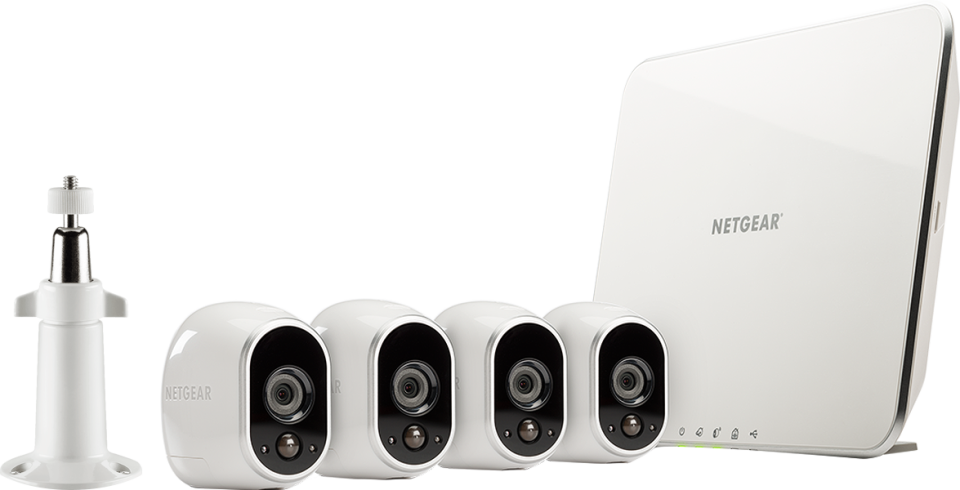Arlo Technologies Stock Craters on Slow Growth Outlook
Arlo Technologies (NYSE: ARLO) wasn't a buy at half off its IPO price back in mid-December, and following another disastrous quarterly earnings report last week, it doesn't look like the security camera maker is a buy now, either. Shares have fallen 75% from when the company went public in August.
Because Arlo is counting on its new, pricey Ultra 4K camera to help it become profitable just as the market for security cameras is slowing suggests it may be a long time before the company is a buy at any price.

Image source: Arlo Technologies.
The gathering storm
The fourth quarter was not kind to Arlo. The Ultra 4K camera was supposed to come out ahead of Christmas to help invigorate sales, but as the new product was about to go on sale, Arlo discovered several problems. Reports of battery life issues, wireless connectivity issues, and an inability to successfully stream in 4K, forced Arlo to delay its release until January.
At the time, Arlo had warned that the delay would result in a revenue shortfall, and though revenue of $129.4 million came in at the high end of the revised lower guidance, Arlo also found it had to deal with a market that was rapidly slowing.
Based on data from NPD Group, Arlo said U.S. consumer network connected camera systems grew 35% in 2016 and 2017, but then decelerated abruptly in 2018 to just 16% growth even as rivals Amazon.com and Alphabet expanded their own security camera product lineups.
However, because retailers were expecting those previously forecast high growth rates, they had stocked up on Arlo cameras and are now stuck with more inventory than anticipated. That caused a cascading effect preventing Arlo from shipping more product now.
Arlo forecasts first-quarter revenue will be only $48 million to $52 million, a far cry from the $126 million analysts had forecast for the period. The shortfall extends to its full-year guidance as well, with the camera maker anticipating revenue of $380 million to $420 million in sales juxtaposed against Wall Street's expectations of $606 million. No wonder then that Arlo's stock cratered.
A costly change in direction
Arlo was spun off from Netgear last August at $16 per share, but after briefly hitting $22 per share shortly after the IPO, it has gone into free fall, and the stock trades below $4 per share as of this writing.
Compounding the security camera maker's problems is its attempt at transitioning from being solely a hardware manufacturer to one that derives most of its revenue from services. Trying to obtain subscribers to its monitoring services has been a costly endeavor, and analysts are worried it may run out of money before it can successfully do so.
Raymond James analyst Adam Tindle wrote in a note to clients after the earnings report that Arlo was in "a race against the clock" because it was burning through cash at an alarming rate. He said Arlo has just $200 million in the bank, but it had an annual burn rate of $100 million.
Although Arlo added 350,000 new registered users to its rolls in the quarter, bringing the total now to 2.85 million, that 47% growth rate is about half of the growth it was achieving a year ago and marks the fourth consecutive decline in its growth rate since it peaked in the fourth quarter of 2017.

Data source: Arlo Technologies' quarterly SEC filings.
A future out of focus
The problem, of course, is Arlo is suffering from intense competitive pressure from Ring and Nest, both of which have expanded their own security camera and monitoring services and increased their quality. Despite Arlo maintaining a 41% share of the U.S. consumer network connected camera systems market, that is down from 48% in the second quarter of 2018.
Its leading position will only deteriorate further in the quarters ahead, and with a security camera market seemingly in the midst of a slowdown, it's going to make it difficult for Arlo to expand as it needs to if it wants to grow.
As this is occurring just as its cash position becomes precarious, Arlo Technologies looks like a no-growth candidate for the immediate future and one investors should avoid.
More From The Motley Fool
John Mackey, CEO of Whole Foods Market, an Amazon subsidiary, is a member of The Motley Fool's board of directors. Suzanne Frey, an executive at Alphabet, is a member of The Motley Fool's board of directors. Rich Duprey has no position in any of the stocks mentioned. The Motley Fool owns shares of and recommends Alphabet (A and C shares) and Amazon. The Motley Fool recommends Netgear. The Motley Fool has a disclosure policy.
